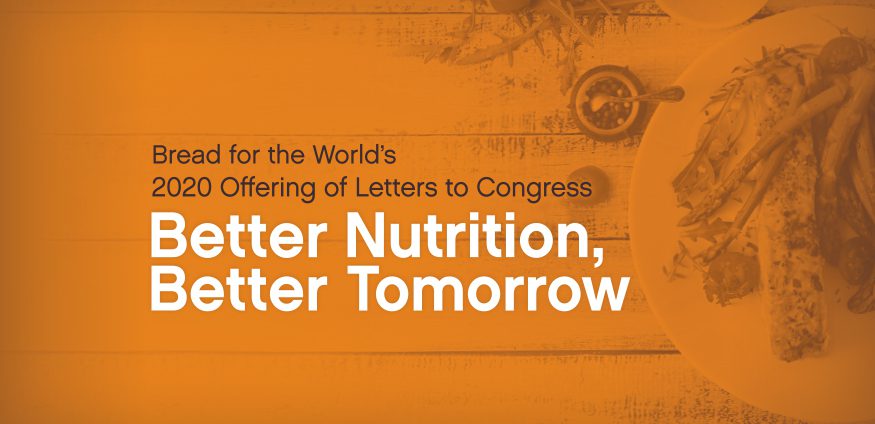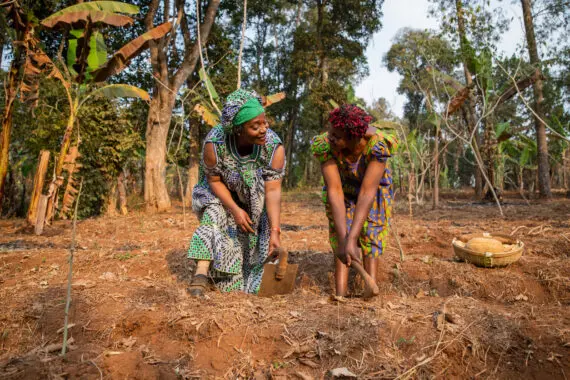As Bread for the World’s 2020 Offering of Letters: Better Nutrition, Better Tomorrow kicks off this month, Matt Gross, director of organizing at Bread, explains this year’s focus and how Bread members can get involved.
Q. The 2020 Offering of Letters: Better Nutrition, Better Tomorrow sounds a lot like last year’s Offering of Letters. What’s the difference?
A. I’m excited about this year’s Offering of Letters because it is both different and the same! Last year we focused solely on global nutrition. This year, we will continue the nutrition focus, but add a domestic component too.
In 2019, we had enormous success in building broad, bipartisan support for our global nutrition resolutions. Our leaders and staff literally had hundreds of conversations with elected leaders about the importance of adequate nutrition. We are going to build on that work and that momentum in two ways. First, by seeking to pass binding legislation that strengthens our government’s leadership on global nutrition and increases funding for those programs. Second, we will be working to ask Congress to increase funding for domestic nutrition programs as well.
Q. Why is it important to focus on the nutritional needs of people living in other countries? How does that focus help end hunger?
A. Let me give you three reasons. First and most importantly, we do it because, as people of faith, we believe every person is made in the image of God, and ensuring they have access to adequate nutrition honors that belief.
Second, it just makes sense. Nutritional interventions for pregnant and nursing mothers and children are an investment that pays off generationally. Those kids grow up and are able to realize their full potential to help their families, communities, and countries.
Finally, nutrition issues can bring all of us together. In the last year, I’ve had the opportunity to meet with hundreds of people across the country to talk about nutrition. Everyone gets it. Everyone supports it. That includes both Democrats and Republicans. In every office I have been in, lawmakers have genuinely sought to learn more and have been interested in figuring out how they can be helpful. Think about that! At a time of historic political division in our country, participating in this year’s OL has the potential to unite all of us around a cause that can literally impact millions of people here in our country and around the world.
Q. The Offering of Letters is also focused on child nutrition in the U.S., specifically during the summer months. Why summer?
A. The hungriest time of the year for children is summertime because they no longer have access to the free and reduced-price meals they receive during the school year.
There are effective solutions though! Our domestic focus this year will be to ask Congress to increase funding for the Summer Electronic Benefits Transfer (EBT) pilot program so more children can access nutritious food during the summer months.
Q. What role does Bread’s Organizing Department play in the Offering of Letters?
A. Bread’s organizing staff works directly with our leaders across the country to invite and equip them in implementing OLs in their congregations and communities.
Increasingly though, we are working with more and more leaders to bring them together with others, particularly in critical states or congressional districts, so that we can conduct OLs collectively, in community with one another.
We are also spending more of our time working with our leaders to schedule in-district meetings so that they can personally deliver their letters and build a direct relationship with their senators or representatives—or their staff. Sending letters through the mail is fine but using our letters as means to build a personal relationship is powerful.
Q. How can Bread members participate in this year’s Offering of Letters?
A. I suggest three basic steps to get your started. First, find a partner (or two or three) and engage your networks. Second, collect letters and scheduling a meeting with the local office of your U.S. senator or representative to hand-deliver them. Third, report your success and feedback to Bread at bread.org/reportback.
There is no wrong time to do an OL. However, the best time is during the first half of the year.
If you’d like to be part of a more collective, organized effort with others, you can sign up for the upcoming regional webinars, and/or reach out to the appropriate organizer in your region or state.



